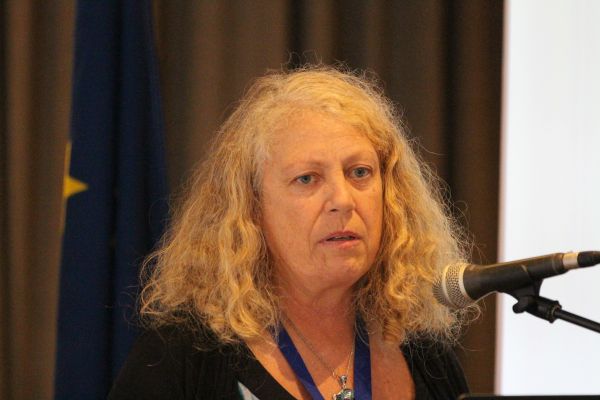
Interview with prof. dr. Vivienne Bozalek, University of the Western Cape in South Africa.
1. Where are you working at this moment?
I am working at the University of the Western Cape (UWC), Cape Town, South Africa. I was in the Social Work Department but am now working in the Directorate of Teaching and Learning, UWC.
2. Can you tell us about your research and its relation to care ethics?
My research is about how care ethics can be used as a normative framework to examine policies, practices and events, the use of care ethics in pedagogy, responsibility, privileged irresponsibility, care ethics and pedagogy, and latterly, care and feminist new materialist ethics.
3. How did you get involved in care ethics?
I studied at Utrecht University and my supervisor was Selma Sevenhuijsen – she introduced me to care ethics and because of this I included care ethics in my dissertation and we started a course for all first year students in the Faculty of Community and Health Sciences, UWC entitled ‘Introduction to the Philosophy of Care’. I was introduced to Joan Tronto through Selma.
4. How would you describe care ethics?
Care ethics is predicated a relational ontology which asserts that individuals or entities do not pre-exist relationships but come into being through relationships. As a relational ethics moral elements such as attentiveness, response-ability, rendering each other capable, responsibility and accountability are ways of ensuring flourishing and checking how well we are doing in relation to flourishing. This includes the human, non-human and more-than-human and the world at large – i.e. it is not human-centric.
5. What is the most important thing you learned from care ethics?
The most important thing I learnt from care ethics is that it assumes a relational ontology and this changes how we see the world. I also learnt from the political ethics of care that morality and politics cannot be separated. I learnt that care is not only important for humans or in private spaces but it is important in the more-than-human and in public spaces. Care and justice go hand-in-hand for me.
6. Whom would you consider to be your most important teacher(s) and collaborators?
Selma Sevenhuijsen and Joan Tronto.
7. What publications do you consider the most important with regard to care ethics?
- Tronto’s Moral Boundaries, Chilly Racists, Work Ethic, Caring and Democracy,
- Sevenhuijsen Citizenship and Care,
- Barad’s interviews on matters of fact, concern and care,
- Vinciane Despret’s work on rendering capable,
- Haraway’s Staying with the Trouble,
- Cynthia Willet Interspecies Ethics and
- Eben Kirksey’s The Multispecies Salon.
8. Which of your own books/articles/projects should we learn from?
- Bozalek, V. (2014) Privileged Irresponsibility In G. Olthuis, H. Kohlen and J. Heier (eds.) Moral boundaries redrawn: The significance of Joan Tronto’s argument for political theory, professional ethics, and care practice. Leuven: Peeters. 51-725
- Bozalek, V. (2014) Integrating difference and care into social justice: Towards a normative framework for care, welfare & social cohesion. In V. Reddy, S. Meyer, T. Shefer & T. Meyiwa (Eds.), Care in Context: Transnational Gender Perspectives. Pretoria: HSRC.
- Bozalek, V. (2015). Privilege and responsibility in the South African context. In Marian Barnes, Tula Brannelly, Lizzie Ward and Nicki Ward (eds.) Ethics of Care: critical advances in international perspective. Bristol: Policy Press, University of Bristol. Pp. 83-94.
- Bozalek, V. (2016) Methodological tools for researching emotions: A political ethics of care perspective. In Zembylas, M. and P. Schutz Methodological Advances in Research on Emotion and Education. Switzerland: Springer pp. 191-202.
- Bozalek, V. (2016) The Political Ethics of Care and Feminist Posthuman Ethics: Contributions to Social Work.In Richard Hugman and Jan Carter (eds.) Rethinking Values and Ethics in Social Work. Palgrave MacMillan. Pp. 80 – 96
9. What are important issues for care ethics in the future?
Climate change, the capitalocene, the plantationocene, the retraction of state services, the international swing to the right, continuing inequalities.
10. How may care ethics contribute to society as a whole, do you think?
Care ethics would change the way society is structured and enable participatory parity. Seeing the world from a relational perspective can assist in ‘staying with the trouble’ (Haraway, 2016) we find ourselves in. We need to foreground attentiveness, responsibility, accountability, rendering each other capable, response-ability in order to attempt to flourish as best possible. The ethics of care would enable this.
11. Do you know of any research-based projects in local communities, institutions or on national levels, where ‘care’ is central? Please describe.
Only the National Research Foundation project that I am currently involved with on Re-imagining higher education pedagogies.
12. The aim of the consortium is to further develop care ethics internationally by creating connections between people who are involved in this interdisciplinary field, both in scientific and societal realms. Do you have any recommendations for us?
It would be great to have a colloquium or conference where we could bring people together or a broader research project which could accommodate the interests of a broader international group of care ethicists.
Vivienne Bozalek
Academia.edu
June 2017
[bol_product_links block_id=”bol_1504371293956_selected-products” products=”9200000012626577,9200000018253040″ name=”Bozalek” sub_id=”” link_color=”003399″ subtitle_color=”000000″ pricetype_color=”000000″ price_color=”DC7605″ deliverytime_color=”009900″ background_color=”FFFFFF” border_color=”CCCCCC” width=”590″ cols=”2″ show_bol_logo=”0″ show_price=”1″ show_rating=”0″ show_deliverytime=”1″ link_target=”1″ image_size=”1″ admin_preview=”1″]

0 reacties